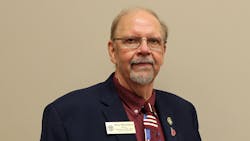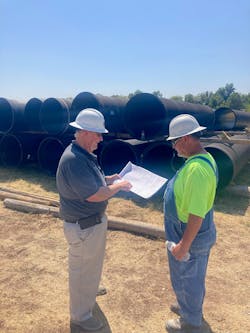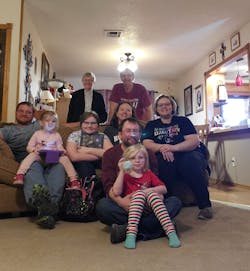Money was not a motivation. Neither was prestige. It was family that anchored Willy “Rusty” Whisenhunt to Lawton, Oklahoma, and his career with the city’s wastewater utility.
A graduate of Oklahoma State University with a degree in construction management and a masters in civil engineering, Whisenhunt envisioned a career in building construction and design. In his first job out of college, he did just that as a project manager; water and wastewater were nowhere in the picture.
The position, however, required a lot of travel, which he found too disruptive to the family life he wanted to build with his wife, Sharon, and his two young daughters at the time, Heather and Charlotte.
When he joined the city, he had limited experience with water and wastewater projects, but the skillset he had built as a project manager set him up perfectly for success. He moved into the engineering department doing design and project management, and followed the flow of opportunity that his career provided, which had him work at each of the city’s plants.
It was with the wastewater system that he made his claim to fame, however. He developed a sewer rehabilitation program that saved the city $50 million over a 20-year period and replaced 35% of the system, despite original estimates of 20%. Whisenhunt said the success was based on analysis of other programs he had seen around the country at the time — Maimi-Dade and Houston were examples — and building on them to make something even better.
“After they did their rehab program, their I&I came back, so I looked at what they did, what we were doing and what we needed to do to keep it from coming back,” Whisenhunt said. “There’s certain small things . . . It’s not a big thing that makes the difference, it’s the small intricate details.”
His plan set a standard and was recognized by Water Environment Federation (WEF) in 2004 when he presented the sewer rehabilitation and capacity, management, operations and maintenance (CMOM) program at a WEF Collection Systems luncheon. It also earned a National League of Cities Silver Award.
While the sewer rehabilitation plan created a spark and his attention to detail kindled the flame, the fire his peers recognize roars as a result of his work ethic and his intimate knowledge of the utility, its systems, and the engineering behind it.
“I’m not sure I know somebody with a better work ethic than Rusty. Early mornings and late nights; he really truly is committed, and not just committed for a grandiose reason. He’s doing it to just do it right,” said Mary-Elizabeth Mach, western region water director for Garver.
Working with Rusty
Mach first met Whisenhunt around 2013. She was looking for some answers to questions about the Lawton water distribution system while working on a project, and his name kept coming up.
“He knew literally everything about Lawton’s water and wastewater system,” Mach said. “He was very well-informed. Every question that I had he was able to answer.”
Even in her first impression she said he was generous and kind but, most of all, he knew how to do things right. In the years since, Mach has worked with Whisenhunt on drinking water and wastewater projects galore, but she said his strength of character shined through when he inherited the Lawton wastewater system.
In the middle of his career with the city, Whisenhunt moved to the water plant and turned over the wastewater plant to a colleague to manage and operate. Years later, he returned to the plant, which was in need of a lot of work. It was that moment to which Mach pointed about his character.
“After the walk through, he was really surprised and — I don’t want to speak for him — but maybe even ashamed at the state of the facility he inherited,” Mach said. “So to communicate that, communicate the level of necessity without throwing somebody — a predecessor — under the bus, and then to also convince the city management and the elected officials how incredibly important it was, it was not something just anybody can do.”
Those moments showed a degree of grace that is inspiring but, more importantly, he put a plan into action. Whisenhunt created a multi-phased approach that would address the problems at the plant, and bring it back to the award-winning status it had achieved in years past.
“It required an immense amount of vision, sitting down and really thinking things through, and that collaboration with our firm . . . and trust that we built to work through that, I think, was instrumental to where we are today and getting it back on track,” Mach said.
Whisenhunt said that hearing his peers speak of him so highly was humbling.
“There’s never anything wrong with doing it right and being kind and treating people the way they should be treated,” Whisenhunt said. “And in our industry, [we do] what’s right for our citizens and for the people that we work for and go above and beyond.”
Workforce development
The skillset that Whisenhunt displayed with correcting the wastewater treatment plant issues extends into his management style. Mach said he provides excellent commentary on projects that she’s working on, and noted just how important it was to her work.
“He’s able to not just provide comments, he’s able to provide useful information towards the success of a construction project,” Mach said.
“I have a great staff, and one of the biggest challenges today is getting people into this industry,” Whisenhunt said. “It’s a great industry, a great career opportunity for many people working, but I think it takes champions to really promote the industry.”
Whisenhunt said those champions need to go to local schools to engage school children in water and wastewater treatment, particularly with STEM classes, which form the basis of work that is done in the industry.
He has taken his own words to heart too. His daughter, Heather, is the director of planning for the city of Lawton, giving a new meaning to the generational infrastructure to which he has dedicated his career.
A humble carpenter with an anchor
Whisenhunt was introduced to carpentry in his teenage years, which ultimately lead him down the path of construction management for his degree. But since that time, he has shifted his philosophy on carpentry.
“Back in the early ‘90s, I decided I would no longer do it for hire,” Whisenhunt said. “I do it for volunteer and to help people out, and that is very rewarding.”
Following Hurricane Katrina, he took time off work to rebuild homes for citizens impacted by the devastating storm. It is work like that that Whisenhunt finds most satisfying, but it is his family and faith that are the anchor to his purpose.
“Those are more important than anything else, your family and your faith,” he said. “They make your life worthwhile.”
So important are those two things that he and his family run the espresso bar at their church, pouring lattes and coffee for the congregation every weekend.
About the Author
Bob Crossen
Bob Crossen is the editorial director for the Endeavor Business Media Water Group, which publishes WaterWorld, Wastewater Digest and Stormwater Solutions. Crossen graduated from Illinois State University in Dec. 2011 with a Bachelor of Arts in German and a Bachelor of Arts in Journalism. He worked for Campbell Publications, a weekly newspaper company in rural Illinois outside St. Louis for four years as a reporter and regional editor.



